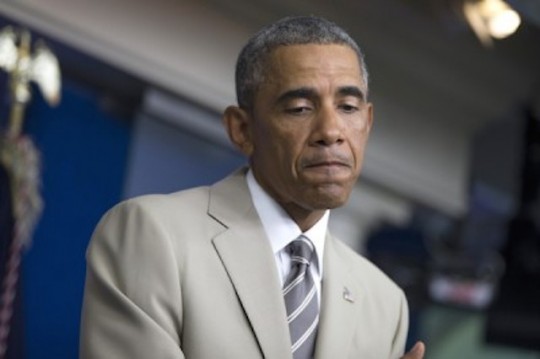Last week Leon Panetta, White House chief of staff for Clinton and later President Obama’s CIA director and secretary of defense, started promoting his new memoir by running a scathing excerpt in Time magazine about the current president’s Iraq policy. In the piece, Panetta blames Obama for the current problems with the Islamic State, suggesting that basically everyone except the president and his inner circle believed that something like the current collapse would happen if U.S. troops were completely withdrawn from Iraq.
This morning, Panetta’s publicity tour continues with an interview in USA Today. His opinion of Obama has not improved. The former secretary of defense expands his critique beyond the issue of residual Iraqi troop levels to making accusations of bad presidential calls on arming the rebels in Syria, on the famous Assad ‘red line’ debacle, and on allowing the sequester to occur. (There might be more—Panetta’s bill of indictment is long enough that it is possible to lose track.)
Perhaps most crushing is that Panetta more or less directly attacks Obama’s leadership abilities:
In the book's final chapter, however, [Panetta] writes that Obama's "most conspicuous weakness" is "a frustrating reticence to engage his opponents and rally support for his cause." Too often, he "relies on the logic of a law professor rather than the passion of a leader." On occasion, he "avoids the battle, complains, and misses opportunities."
In the interview, Panetta says he thinks Obama "gets so discouraged by the process" that he sometimes stops fighting.
Considering that Panetta’s native tongue is the couched, reserved dialect of successful Washington functionaries, that is pretty intense, not to say personal. It bears repeating that this is not a Republican official repeating talking points on cable news, but a powerful Democrat and Obama’s own former secretary of defense.
Panetta’s forthcoming memoir, slouching towards bookstores everywhere tomorrow, is drawing so much attention that it is possible to miss the fact that another memoir is also coming out tomorrow—this one by President Obama’s former ambassador to Iraq Christopher Hill—which reinforces Panetta’s analysis of what went wrong in Iraq.
Also on a marketing campaign, Hill also has an excerpt out—this one in Politico—called ‘How the Obama Administration Ignored Iraq.’ It describes how high-level administration politics ensured that Iraq policy lacked clarity and coordination. When the attention of senior officials could be attracted, it was often counterproductive, as the occasional personal intervention of the president and vice-president was done in a way that contributed "to the perception that the United States was desperate for an election law so that U.S. troops could be withdrawn. By signaling our interest in withdrawal, we began to lose more influence on the ground."
Hill was further removed from the president than Panetta, and thus had less opportunity for close observation, but his frustration with Obama, and for that matter with Biden and Clinton, clearly comes through.
USA Today also reports that administration officials are getting annoyed by the criticism:
[Panetta’s] book was the target of a veiled rebuke Thursday by Biden. "I'm finding that former administration officials, as soon as they leave write books, which I think is inappropriate," Biden told students at Harvard. "At least give the guy a chance to get out of office."
There is a kernel of sense to Biden’s complaint, but likely not one he would endorse. Wouldn’t it be nice if public officials had the integrity to resign when the policies they are enforcing are manifestly leading to disaster? Keeping careful notes and biding your time until you can claim, for profit, that little of what went wrong was your fault is an unfortunate phenomenon: Not because it annoys those who are still in office, but because its prevalence as a custom is evidence of a crisis in the character of America’s political class.
Hill's memoir—as that of a career Foreign Service officer, rather than of a purely political player—is more immune to this charge than Panetta's. But Americans can be forgiven for observing that right now administration officials are, with straight faces, saying that all is well with the Islamic state, that we have nothing to fear from Ebola, that sanctions are having their intended effect Russia, and on and on. When the 2016 elections roll around and others who leave the administration think they can sell some books, what will we learn then from those who keep silent now? And will their books—as Panetta's does, in its description on Amazon—also be marketed as "inspiring"?
